Text
In a piece for The New Inquiry from back in 2017, George Dust states that when queer people complain about there being a top shortage, what they really mean is “nobody is fucking me the way I want, and I have no agency in that.” Alongside co-authors Billy-Ray Belcourt and Kay Gabriel, Dust suggests that many queer people align themselves with a passive or “bottom” position because they believe that role will absolve them of the guilt of really wanting things. They present themselves as what they believe to be the sexual party with zero power; the receiver, the accepter of action rather than its cause.
This position is drawn in contrast to the bottom-identified person’s idea of a top: the one who approaches, the person with hungers and desires, the person who decides which sexual activities will happen and how intense they will get. The top, from this perspective, is the stronger, more capable, more dangerous person. They’re the only one who can ever be guilty of intruding or harming somebody else. This power is scary, but it’s also compelling.
Dust calls this fantastical version of a top a “brute” — and they are the most cartoonish stereotype of what it means in society to be a man. Because it’s a cartoonish stereotype, no human actually lives up to it — and we’d probably revile a person even if they could.
Though queer people know we are harmed by the gender binary and heteronormativity and all the social scripts those things force upon us, its biases are still embossed on our brains. Without meaning to, we reproduce tired gender stereotypes in our relationships. And so we see expressing a sexual want as masculine, and being masculine as being more capable of violence and coercive control, and thus bad. We see failing to communicate one’s desires openly as desirably feminine, as well as a sign of blamelessness and purity — because on some level we still feel it is wrong to have desires.
But this entire worldview is a complete lie. Desire is not evil. Expressing attraction is not a violation. Failing to express oneself can be just as dangerous as not listening to someone else’s limits. Women can be abusive. Bottoms can sexually assault. No matter our gender, presentation, or sexual role, we are each capable of harm. And the only way to make a safe, mutually pleasurable sexual encounter happen is by going after it, actively, and communicating from a position of inner strength.
So how do you do that, if society’s been telling you all your life that you’re meant to date by acting like a deer passively snapping twigs in the woods, waiting for some hunter to hear you, and pursue you? (That really is dating advice that Evangelical Christian counselors give to women, if you can believe it).
By not fixating so much on what you’re doing or not doing to draw other people toward you, and instead thinking in terms of what you want and what you observe beyond yourself.
10K notes
·
View notes
Text
Because when your brain thinks you're in real true serious danger, it pumps out all kinds of cool brain chemicals, like adrenaline and endorphins. Adrenaline is thrilling and exciting, and endorphins are your body's homebrew version of opioids that produce euphoria and distance from pain. To many people (me included), they feel fucking amazing.
Uuuunfortunately, getting your brain to turn those taps on involves making it think you're in real true serious danger. And one of the simplest ways to achieve that is to put yourself in real true serious danger. Which has the downside of being, well... dangerous.
We ask your questions so you don’t have to! Submit your questions to have them posted anonymously as polls.
16K notes
·
View notes
Text
are we talking about broke therapists yet?
I've been out of things for a couple of years now, which is why I'm willing to talk about it, and maybe the pandemic has helped things a little, but holy shit the counselling and psychotherapy field is not equipped to help its practitioners in the gig economy.
Of all my interests and talents, I pursued a degree in psychology because being a therapist is supposed to be a safe, stable, well-paid job. Every therapist I met who was registered before 2008 worked and lived under that assumption. And oh boy are all the fee structures--registration, supervision, continuing education, conferences--set up for that scenario.
After getting my Master's, I struggled like hell to get a job. It was especially bad because to get my license, I needed a supervisor to take me on. To take me on, most supervisors wanted me to already have a caseload and client base. To get a caseload and client base, I needed a job.
Friends: Every single job I heard back on wanted me to have my license before I could even land an interview.
Professors and career advisors and professional development specialists all advised me very earnestly to just keep cold-calling people on the supervision list, and it began to feel a lot like my parents' friends telling me to hit the bricks and hand out resumes. That's what worked for them, right?
I finally got a supervisor who agreed to take me on, and I'd be able to use her clinic for advertising and workspace, and we were doing the paperwork to send in with my registration, when she called me up and said, "Is this job going to be your only source of income? If you're trying to depend on getting clients and building your practice for your basic needs, this is not going to work out. This has to be something you're doing on top of a basic salary. Okay, so you're not working anywhere else right now? I'm sorry, I can't move forward with this."
Even once I landed a supervisor and a job building my own private practice, I struggled. I have ADHD and am not great at self-promotion, so trying to do all my own advertising, scheduling, bookkeeping, billing, and records management (on top of counselling) was an enormous strain. One my bosses, supervisors, and other senior professionals watched with a slightly critical eye, but consoled me about because in their early days, their clinics had had business managers, receptionists, filing clerks, and accountants, and getting used to doing everything online yourself was a bit of a learning curve, wasn't it?
I counted my pennies very carefully, because I had to pay my supervisor roughly $180 for their services every 6 hours of in-person counselling I did. This meant that to break even I had to charge my clients an average of about $30 (plus room rental and service fees) an hour--and my clients, being people with complex trauma, were frequently poor, disabled, unemployed, and had no health benefits, so even $10 or $20 a session was a lot for them.
Maybe it would have been easier if I could have taken some of those nice comfortable organization positions where they find clients and funding for you and you work 40 hours a week and get benefits and a pension, but I had to be disabled into the bargain, so working 40 hours a week just isn't possible for me. I start passing out from stress and exhaustion. Older colleagues gave me serious-faced advice about approaching my employer and asking them for some flexibility and accommodation in my schedule, and I tried to explain across the gap between us that employers simply did not hire me if I made the slightest noise about the workload. They weren't going to invest in me as a person; they were hiring 40 units of work a week, and if I wouldn't do it there were a dozen applicants after me who would.
At one point I broke down enough to email my licensing body because the Annual General Meeting/Professional Development Conference was coming up, and I wanted to attend, but I could not produce $500 to do it with. Was there some kind of way I could attend anyway? I felt ashamed to have to ask, and then absolutely mortified when the response came from the organization president, who needed to personally sign off on me being too poor to attend the single most important event in my profession's calendar year.
I honestly felt so ashamed all the time at how I was apparently failing to be a successful therapist, failing to be rich and successful, and every time I mentioned it around mentors and bosses, I could feel myself shrinking from a person to a problem to be solved. My closest therapist-friends and I have reflected on how much more difficult, poorly-paid and underworked, our various career starts have been than we were ever warned about. About the classmates and coworkers who couldn't get disability exceptions when they fell behind in their registration requirements, or burned out and left the field, or dropped their registrations and took up as life coaches, or moved their whole family somewhere exceptionally remote or rural because it was the only good job available, or worked for some godforsaken app skirting the bounds of malpractice like BetterHelp.
I like those conversations, because I feel less like an absolute fuck-up in them. There's less "Hey Lis, you were so talented in grad school, I really admired you, what are you doing now?" "Oh, I, uh... am professionally disabled, so I get government benefits, and I... sell embroidery patterns on Etsy now."
My own therapist kept asking if and when I felt like going back to being a counsellor, and I finally told him: I don't, actually. I don't want to go back and do it like I was doing it before. It was a profession I loved to the depths of my soul, and it profoundly did not love me back. I can't even imagine what would have to change, in me or it, to make it have a space in it that could fit me.
All of which I was way too scared to admit to at the time, because the more I let people know I was struggling, the more they hinted that maybe I just wasn't in a place in my life where this was a job I could do, and I needed to take a little break and wait to come back until money and disability just weren't issues for me anymore.
Eventually my cups of doubt and exhaustion did overflow, and I quit. I'm here now, living a much different life. And at the very least, all my years of helping people in bad life situations set me up perfectly for my own. I already knew what form to fill out for financial assistance, which student clinics to access for mental health support, and which government agency would, if pressed, cough out pharmacy coverage for the genuinely destitute. It gave me that much.
I hope this is just me being in extraordinary circumstances, sitting at the intersections of a few different shitty life situations that most people skip right past. Because it's on one level comforting, but another deeply infuriating, if I'm not, and I've just missed it or we've just all been too afraid to admit it to each other.
536 notes
·
View notes
Text
Thiiis. There are safe ways to practice kink, and being kinky isn't the same as being abusive.
It's true that a lot of abusers use the vocabulary of kink to justify hurting people, but it's like how a lot of health grifters use the language of science to scam people with dangerous or ineffective medicine. Some people spouting bullshit doesn't mean that valid science, or risk-aware consensual kink, doesn't actually exist.
It is NOT safe or consensual to choke, smother, or suffocate someone without talking about it first, making sure you both understand the risks and what is more or less dangerous, making sure you're both into it, and having some way to communicate "no, stop" that works and will be respected even when one partner (as is often the case here) cannot form audible language.
(Edited to add: People in the notes are like "Even only 30 seconds is dangerous!" and sorry loves, it's worse than that. You can completely pass out within the first 10 seconds. There's literally no amount of breathplay that isn't hazardous.)
Anyone who tries to choke, strangle, or smother another person without this kind of willing and informed consent risks grievous harm or death to that person, severe legal penalties to themselves, and whether through ignorance or outright malice, is a dangerous person who merits every effort to stop or get away from.
This is true whether you are a man, a woman, trans, cis, gay, or straight. It matters whether the other person is a lover, a parent, a stranger, a friend, or an enemy. If you feel afraid or unable to keep yourself safe, please reach out to a domestic violence organization or, if you're a minor, a child help line for emotional support, danger assessment, advocacy on your behalf, and help figuring out how to find safety.
We ask your questions so you don’t have to! Submit your questions to have them posted anonymously as polls.
#kink tw#bdsm tw#ipv tw#domestic violence tw#god remembering that fucking sam levinson/the weeknd show#COULD U MAYBE NOT#choking tw#strangulation tw
16K notes
·
View notes
Text
Adding my knowledge from the domestic violence realm, because this is a really big deal:
Having your partner wrap their hands around your throat (strangulation) is both imminently dangerous, potentially dangerous for days afterward, and unless it's something you've specifically asked them to do to you, can be a huge warning sign that you should be worried about their willingness to use violence against you.
A lot of people think the big issue is that strangulation compresses the trachea and hinders breathing. That's a thing, but what's even more dangerous is the compression of the blood vessels in your neck, which can directly cut off blood flow to your brain.
Even after the strangulation is over, there are potential lasting effects—brain damage, memory loss, and confusion, which often make strangulation victims very poor reporters of their own level of injury, which means that if, say, police show up following a fight, the victim might honestly say that they don't think they were hurt very much and they feel fine.
About half the time they will have very small visible symptoms, like bruises on their neck, a raspiness to their voice, very small red specks on the skin of their neck or face, or burst vessels in their eyes. Half the time they won't.
Which is not always a great way to tell which of them, in the days afterwards, will have a blood clot travel into their brain and cause a stroke, or will experience seizures and memory issues over the next several months or years. Those things might not be spotted without specialized medical attention and tests. If you've ever been strangled, tell a doctor; it may still be putting you at medical risk.
And aside from the medical risks, there are indicators that someone who has survived being strangled by an intimate partner is at a much higher risk of being a homicide victim. That basically, the willingness to strangle as an act of aggression can signal that they are more willing and able to actually kill you.
We ask your questions so you don’t have to! Submit your questions to have them posted anonymously as polls.
16K notes
·
View notes
Text
It's been a hot minute since I looked at Canada's National Occupation Classification system. I learned about it when studying career counselling in grad school, and it's pretty useful in terms of job-hunting and getting information on what different types of jobs require and pay.
A friend asked me for advice about becoming a therapist so I went and looked. They redid it since I last visited, and oh man there are some chef's kiss decisions.
There are 9 top-level categories, with 1 being legislative and senior management, 5 being arts, culture, and sport, and 9 being manufacture and utilities. So I was looking for my old job's classification, which used to be 4153 - Family, marriage and other related counsellors. Knowing that made searching the government job bank really easy back in the day, because instead of searching "counsellor" "counselor" "psychotherapist" "mental health therapist" "clinical counsellor" etc etc etc to find them all, I just typed "4153" and hit enter.
Anyway, they redid the system and now that job is parked at 41301 - Therapists in counselling and related specialized therapies. Here's the tree to get there:

Cool cool cool. It's tidier, even if the occupations are still a bit messy. (When I dropped out of the field, the different counselling subdivisions were tapping their toes impatiently waiting for the provincial government to let them form their own professional regulatory college. Which still has not happened. Last week my shrink said he'd got an email from the College of Psychologists announcing that it would be gathering all the smaller counselling fields into its own downy breast instead. I have no idea what's happening anymore.)
Anyway. I scrolled down to another job I once worked and HAHA WHAT

Yes. There are only three sub-units of category 44:
Nannies:

In-home caregivers:
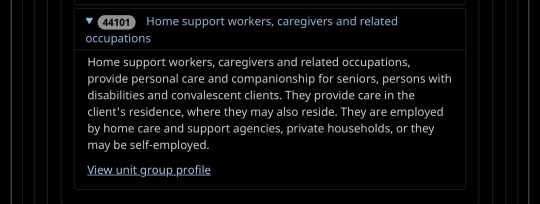
And,
Combat specialists
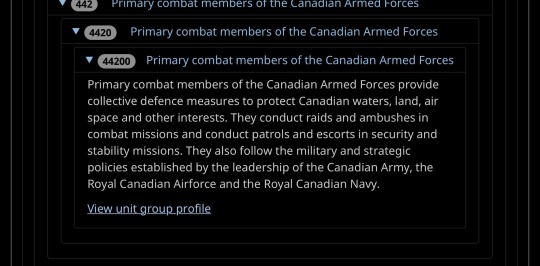
I find this grouping of professions hilarious, appropriate, and deeply validating. No notes. 🧑🍳👌💋
#staranise original#advice on therapisting#that was the job I still have a scar on my arm from#i badgered my supervisor to death to get that fucking gentle self-defense course because of now unsafe it felt sometimes#man that job broke me#only good thing about that year was my cat and nacho movie night with my roommates#here's to never having to live that year again#sláinte and amen
175 notes
·
View notes
Text
A couple job interview hacks from someone who has to give a job interview every single goddamn day: (disclaimer: this goes for my process and my company’s process, other companies and industries might be different)
1. There are a few things I check and a few questions I ask literally just to figure out if you can play the game and get along with others in a professional setting. Part of the job I interview for is talking to people, and we work in teams. So if you can’t “play the game” a tiny bit, it’s not going to work. Playing the game includes:
- Why do you want to work here? (just prove that you googled the company, tell me like 1 thing about us, I just want to know that you did SOME kind of preparation for this interview)
- Are you wearing professional clothing? I don’t need a suit just don’t show up in a ratty t-shirt and sweatpants.
- Are you able to speak respectfully and without dropping f-bombs all the time? Not because I’m offended but because I don’t want to be reported to HR if you wind up on my team.
- Can you follow simple directions in an interview?
2. Stop telling me protected information. I don’t want to know about what drugs or medications you’re on, I don’t want to know about you being sick, I don’t want to know if you’re planning to have children soon, I don’t want to know anything about your personal life other than “can you do the job?”
3. When we ask, “What questions do you have for me?” here are my favorites I’ve heard:
- What does the day-to-day look like for a member of your team?
- If one of your team members was not performing up to his usual standard, what steps would you take to correct that?
- What can I start doing now to accelerate my learning process in this job?
- What are some reservations you have about me as a candidate? (be ready for this emotionally….it will REALLY help you in the future, and I’ve had people save themselves from a No after this, but can be hard to hear)
- In your opinion, what skills and qualities does the ideal candidate for this job possess?
- What advice would you give to a new hire in this position/someone who wanted to break into this industry, as someone who has worked here for a while?
Those are just my tips off-the-cuff. I work in sales in marketing/SAAS, so these can be very different depending on the industry, but I wish the people I interview could read this before they show up.
36K notes
·
View notes
Text
As a rape survivor, I understand the need for safe space together – free from sexist harassment and potential violence. But fear of gender variance also can't be allowed to deceptively cloak itself as a women's safety issue. I can't think of a better example than my own, and my butch friends', first-hand experiences in public women's toilets. Of course women need to feel safe in a public restroom; that's a serious issue. So when a man walks in, women immediately examine the situation to see if the man looks flustered and embarrassed, or if he seems threatening; they draw on the skills they learned as young girls in this society to read body language for safety or danger.
Now, what happens when butches walk into the women's bathroom? Women nudge each other with elbows, or roll their eyes, and say mockingly, "Do you know which bathroom you're in?" Thats not how women behave when they really believe there's a man in the bathroom. This scenario is not about women's safety – its an example of gender-phobia.
And ask yourself, if you were in the women's bathroom, and there were two teenage drag queens putting on lipstick in front of the mirror, would you be in danger? If you called security or the cops, or forced those drag queens to use the men's room, would they be safe?
If the segregation of bathrooms is really about more than just genitals, then maybe the signs ought to read "Men" and "Sexually and Gender Oppressed," because we all need a safe place to go to the bathroom. Or even better, let's fight for clean individual bathrooms with signs on the doors that read "Restroom."
And defending the inclusion of transsexual sisters in women's space does not threaten the safety of any woman. The AIDS movement, for example, battled against the right-wing characterization of gay men as a "high-risk group." We won an understanding that there is no high-risk group – there are high-risk behaviors. Therefore, creating safety in women's space means we have to define unsafe behavior – like racist behavior by white women towards women of color, or dangerous insensitivity to disabilities.
Transsexual sisters are not a Trojan horse trying to infiltrate women's space. There have always been transsexual women helping to build the women's movement – they are part of virtually every large gathering of women. They want to be welcomed into women's space for the same reason every woman does – to feel safe.
Leslie Feinberg, Transgender Warriors: Making History from Joan of Arc to Marsha P. Johnson and Beyond
27K notes
·
View notes
Text
In the wake of what’s going on in the world, I see a lot of rhetoric that basically boils down to the idea that everyone has a responsibility to watch every bad thing that’s going on in the world all the time. That awareness itself is a responsibility that everyone has always.
I’m not going to say that people do or don’t have a responsibility to be aware of things, but I want to talk about how to take care of yourself and others while doing so.
For some context, I spent close to a year and a half reading about every terrorist attack in the world as part of my work on the Global Terrorism Database. It was 2015/2016, so this was the height of ISIS/Daesh, it was a major time for Boko Haram, and it was when there was a lot of political violence that we weren’t sure how to classify in places like Yemen, Crimea, and Libya (stuff the GTD didn’t know how to classify had all of is information recorded, and then it went into purgatory until someone above my paygrade decided what to do with it). What this means is that I was spending 10-20 hours a week reading about hundreds or thousands of attacks a month and, in my case, recording infomation about the type of attack and the type of weapon. Much of my life was reading terrible things.
Limit what you do in isolation. One of the worst changes for me during that time, mental health-wise (even though it was great for my commute) was when I went from working in-person to working remotely. With other people, there are ways to diffuse the pain. A burden shared is a burden halved and all that. That may mean talking about it, or joking about it, or finding some other way to engage with it that isn’t just reading about the most horrible things in the world and then stewing in your own thoughts about them.
Find something to do that’s totally unrelated. I highly recommend finding something to do with your hands, if you can (knitting, Lego, cooking, whatever), but regardless of what it is, you should have some time when you entirely switch away to something different. During a fair amount of my time with the GTD, I was also doing my undergrad thesis about terrorism on TV, so a huge amount of my life was about terrorism in some way. The only other thing I watched was Great British Bake Off, and I would just rewatch the episodes, over and over.
Be compassionate about how you share information and with whom. Use trigger warnings, and consider using consistent tagging on places like Tumblr so people can blacklist it if they need to. Also consider whether it’s appropriate or necessary to share photos of bodies or other results of horrible violence. What is it accomplishing, to show that? Can that goal be accomplished other ways that don’t require the equivalent of jumpscares of unexpected photos of dead or brutalized people? Are you just showing it because you think that everyone should have to see it? If you are showing it, are there ways to mitigate against harm it may do?
Do what you can to avoid an echo chamber. Sometimes, when everyone around you is upset or angry about the same thing, it just amplifies itself, and you all get angrier and more upset in perpetuity without accomplishing anything.
Work towards action. Watching terrible things happen for the sake of saying that you haven’t looked away isn’t as meaningful as taking action in some way. Write to your Congressperson. Donate. Do whatever is appropriate for the thing you want to stop. But penance via watching terrible things happen doesn’t accomplish anything.
Recognize compassion fatigue and do what you can to mitigate it. If you spend long enough doing this, you start to lose context, and you start to become less able to have compassion about things. If you’re reading about attacks with dozens or hundreds of deaths regularly, five can start to not seem like that many. If you’re reading only about the worst suffering in the world, “lesser” suffering of those around you can start to seem unimportant and petty. Do what you can to mitigate that.
Be kind to yourself. You do nobody any good if you burn out. Look away, if you need to. Take a break. Do things so you can enjoy life, because otherwise you are just another person suffering in the world. Other people’s pain isn’t a hair shirt for you to wear.
972 notes
·
View notes
Text
I'm kind of at a point where the "queer spaces" i feel safest in are the ones that have a pet cishet dude or two hanging around
66K notes
·
View notes
Text
reading supercut: disability, body image, and trauma
A glimpse into the clothes thrashing around in the washing machine of my mind, with apologies that it is still a wet lump and not an actual synthesis of ideas.
From Easy Beauty: A Memoir by Chloé Cooper Jones:
[This event] embedded a damaging idea in me, one I’d recognize deeply when I read Scarry years later: beauty was a matter of particulars aligning correctly. My body put me in a bracketed, undercredited sense of beauty. But if I could get the particulars lined up just right, I could be re-seen, discovered like the palm tree is discovered. To be deserving of the whole range of human desires, I had to be extraordinary in all other aspects.
In this new light, I started to see my work, my intellect, my skills, my moments of humor or goodness, not as valuable in themselves, but as ways of easing the impact of my ugliness. If only I could pile up enough good qualities, they could obscure my unacceptable body. [...] accepting the argument that beauty was malleable came, for me, with a cost. The Platonian view rejected me cleanly, but Hume and Scarry left a door ajar and I’ve spent a lifetime trying to contort my form to see if I could pass through it.
From Til We Have Faces: A Myth Retold by CS Lewis:
I now determined that I would go always veiled. I have kept this rule, within doors and without, ever since. It is a sort of treaty made with my ugliness. There had been a time in childhood when I didn't yet know I was ugly. Then there was a time (for in this book I must hide none of my shames or follies) when I believed, as girls do — and as Batta was always telling me — that I could make it more tolerable by this or that done to my clothes or my hair. Now, I chose to be veiled.
From Cognitive-Behavioral Therapy of Borderline Personality Disorder by Marsha Linehan:
Inhibited grieving is understandable among borderline patients. People can only stay with a very painful process or experience if they are confident that it will end some day, some time—that they can "work through it," so to speak. It is not uncommon to hear borderline patients say they feel that if they ever do cry, they will never stop Indeed, that is their common experience—the experience of not being able to control or modulate their own emotional experiences. [...] In the face of such helplessness and lack of control, inhibition and avoidance of cues associated with grieving are not only understandable, bur perhaps wise at times. Inhibition, however, has its costs. [...]
Volkan (1983) describes an interesting phenomenon, "established pathological mourning", which is similar to the pattern I am describing. In established pathological mourning, the individual wishes to complete mourning, but at the same time persistently attempts to undo the reality of the loss.
From How to Respond to Criticism by Danny Lavery:
Apologize, but don’t really mean it, and plant a seed of secret resentment so deep in your own heart that years later you can’t even remember that you’re the one who nurtured it and made it grow, it seems that much like a native part of you.
From Tiny Beautiful Things by Cheryl Strayed:
[After learning that state child protective services had made a budgetary decision to only intervene with children under 12, to one of the teenagers that regularly shared stories of abuse at home]
I told her it was not okay, that it was unacceptable, that it was illegal and that I would call and report this latest, horrible thing. But I did not tell her it would stop. I did not promise that anyone would intervene. I told her it would likely go on and she’d have to survive it. That she’d have to find a way within herself to not only escape the shit, but to transcend it [...] I told her that escaping the shit would be hard, but that if she wanted to not make her mother’s life her destiny, she had to be the one to make it happen. She had to do more than hold on. She had to reach. She had to want it more than she’d ever wanted anything. She had to grab like a drowning girl for every good thing that came her way and she had to swim like fuck away from every bad thing. She had to count the years and let them roll by, to grow up and then run as far as she could in the direction of her best and happiest dreams across the bridge that was built by her own desire to heal.
From Essays in Aesthetics by Jean-Paul Sartre:
Freedom is what you do with what's been done to you.
From "I Know What You Think of Me" by Tim Kreider:
if we want the rewards of being loved we have to submit to the mortifying ordeal of being known.
#mental health tw#trauma tw#child abuse tw#child neglect tw#staranise original#kinda#there's also a lot I've been reading about avoidant personality disorder that DEFINITELY needs a lot more baking#before it's ready to be unleashed onto the public
151 notes
·
View notes
Text
Valentine's Day for embroidery nerds
Something I love about historical embroidery is how much the present and the past are stitched together. Valentine's Day is one of those things that's centuries old, but still a little new and fresh every time it rolls around. It is what we put into it, as well as what it used to be.
I print patterns onto interfacing that sticks to the fabric while you stitch. Then when you're done, you just dunk it in water to wash the pattern off!
So here are my new festive offerings:

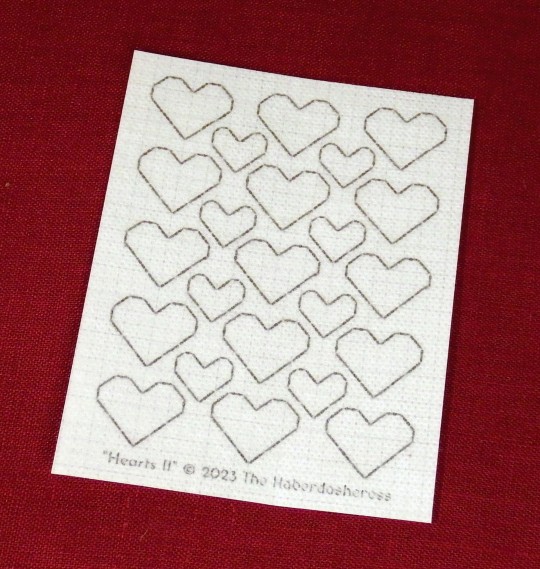
Visible mending patches: Hearts I and Hearts II
I couldn't decide on one, so why not both? These are great if you want an easy way to embroider little wee hearts on things! They really shine when they're used for visible mending. You can use them to attach new patches to holes in old clothes, and look good doing it.
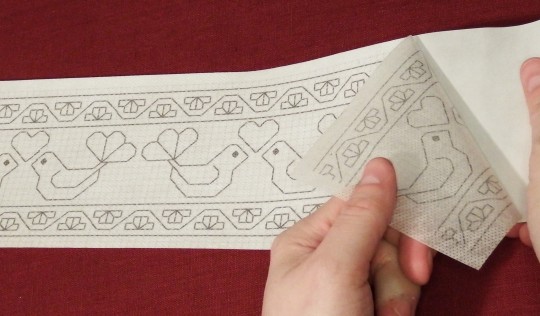
Embroidery Border: Lovebirds High
I wanted something big and fun, so I designed this one myself. Its figurative grandparents are Renaissance blackwork and Scandinavian Rosemaling. I liked being able to combine an existing embroidery border into a bigger pattern. 7.5 cm (3") wide and 16" (40cm) long.
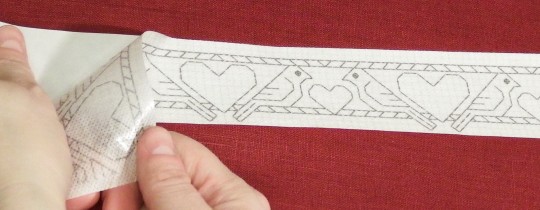
Embroidery Border: Lovebirds Low
Another original design! I've been making a lot of birds lately. To me these feel like office-worker sparrows that have stopped to kvetch together on a window ledge during their seed break. Love... is on the staff meeting agenda. 1 ¼" (3.5 cm) wide and 40 cm (16") long
And finally...

The apple of my eye, the jewel of my crown, Renaissance Hearts
God bless Bartolomeo Veneto (active 1502-1531), who was incredibly good at painting clothing. Because this one, I could make literally the same pattern. I could just go...
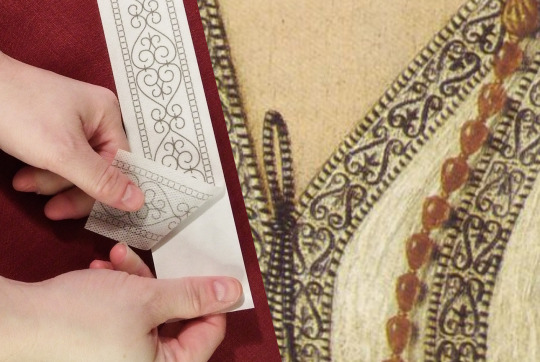
The pattern is 3.5 cm (1 ¼") wide and 16" (40 cm) long.
My Etsy Store has even more designs, as well as some fashion accessories. Shipping is free on orders $40 CAD and above.
And as always, I remain deeply grateful for your attention, energy, enthusiasm, and patronage. I am so lucky to have this business; it's changed my life. Thank you!
497 notes
·
View notes
Text
The metric I used with this post's examples was, "If a woman wore it, would we call it a skirt/dress?"
For example, women in a lot of horse-based nomadic cultures wore leggings or similar such bifurcated garments under what we'd absolutely still call skirts or dresses.
When schoolgirls wear kilts, they're skirts.

Dress or cassock? It really feels like the answer is entirely based on the gender and religious status of the wearer.
The central point here is that assumptions about gender roles in the past are often very attached to theories that women's clothing made it impossible for them to participate in many aspects of daily life.
Thus a very relevant question is, "Who wore that kind of garment, and what kinds of work did they routinely do?"
When we're asking that question, it matters if you decide an outfit falls under different categories depending on the gender of the wearer, because those categories are at the heart of the thing being questioned.
Feminist fantasy is funny sometimes in how much it wants to shit on femininity for no goddamned reason. Like the whole “skirts are tools of the patriarchy made to cripple women into immobility, breeches are much better” thing.
(Let’s get it straight: Most societies over history have defaulted to skirts for everyone because you don’t have to take anything off to relieve yourself, you just have to squat down or lift your skirts and go. The main advantage of bifurcated garments is they make it easier to ride horses. But Western men wear pants so women wearing pants has become ~the universal symbol of gender equality~)
The book I’m reading literally just had its medievalesque heroine declare that peasant women wear breeches to work in the field because “You can’t swing a scythe in a skirt!”
Hm yes story checks out

peasant women definitely never did farm labour in skirts
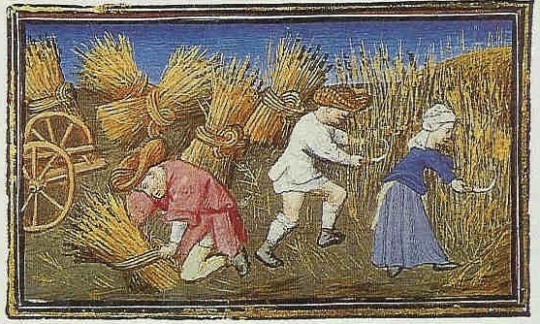
skirts definitely mean you’re weak and fragile and can’t accomplish anything

skirts are definitely bad and will keep you from truly living life

no skirts for anyone, that’s definitely the moral of the story here
#meanwhile#speaking of dumbass things i've said over the years#here is me being dragged by someone I respect because I forgot COLD existed#I FORGOT WINTER EXISTED IN FRONT OF ANOTHER CANADIAN#cover me in maple chips and let me moulder in shame 😂
92K notes
·
View notes
Text
now, hold still—
I'd kill for some resources on body image in the context of disability, chronic pain, and having grown up with a complicated and intense medical history. I think I've exhausted my local library's offerings. Yes, I'm seeing a counsellor who focuses on this, and he's probably got recs, but I'm pacing my cage and lashing my tail in between sessions.
"Body image" has a particular connotation most of the time, because it comes out of the field that deals with eating disorders. Which is great and I'm glad for the people it works for, but its basic principles and assumptions are for completely different problems than the one I have.
I can't track down who said it first, but in my reading I keep coming across this narrative of, "I saw my body as something to be disciplined and controlled, an object only seen by external eyes. Now I've learned to take joy in what my body can do and experience, and to see it as a site of pleasure."
...Sounds fake, but okay.
My body is a site of pain. It cannot do or bear the experience of many things. I have to exercise a huge amount of discipline and control just to get out of bed every day. I can't imagine my body being a visible object that other people might find pleasing; it's incredibly hard to look up from my continual tooth-and-nail fight getting my body to let me live to imagine what someone who doesn't live with all this shit might see.
When I was a child, I learned to hold myself very still. For a hairdresser, or photographer, or a dentist, or someone who wanted to measure my height, or an injection, or a doctor who wanted a demonstration of how one of my joints looked, or an X-ray, or an IV inserted, or a CAT scan, or to have a cast taken off, or a PET scan, or to have a wound treated, or an MRI, or to have a pin pulled out.
And you know, I got proud of that. I felt like a brave warrior in a fantasy novel. I learned to take deep breaths, and take myself in my mind away from the anxiety and unpleasantness, until I could shut down my reaction to it. So that I didn't flinch or scream or cry. Because there was something wrong with my body, and doctors knew how to fix it.
When I was getting assessed for fibromyalgia, this new doctor told me he was going palpate areas in my back, arms, and knees. I get a lot of massage; I knew what was coming. I slowed my breathing, concentrating on the long outbreath. I took myself away from my reactions and thought continually, obsessively, about letting my body droop, weightless, like the moment when your aching limbs meet a solid surface and fresh cool sheets.
"Hm, I dunno," he said. "A lot of this checks out, but your trigger point exam was totally negative. Most people, when I touch those points, they have a big reaction. Some people even scream and jump off the table."
"Well, no," I think I said. "If I'd done that, it would have hurt way more, for like, hours." And I was polite about it, because you have to be polite to doctors; doctors know how to make you feel better. But what I felt at the time, and still feel today, is a kind of outrage I labelled was unreasonable the moment it was born: You wanted to hurt me, and it's my fault for not letting you?
How do you learn how to ask for things, when you've taught yourself to lie still and cry quietly because the nurse who said they'd be right back is helping someone who suddenly needs the help more? How do you express yourself, when you've spent your whole life gritting your teeth?
The problems I have about my body are not about being attractive or thin. They are, however, about being small. Learning to cry less, scream less, and ask for less. About feeling like my body is a burden to anyone who comes to know it, and like that's a burden I can't ask other people to take on unless I'm staggering under the weight of it.
Right now, what I've got is this:
Remember, you weren’t the one
who made you ashamed,
but you are the one
who can make you proud.
Just practice,
practice until you get proud, and once you are proud,
keep practicing so you won’t forget.
You get proud
by practicing.
293 notes
·
View notes
Text
Do you ever get a bot message so weird you want to walk it to a cafe and feed it coffee and greasy food until it sobers up a little?
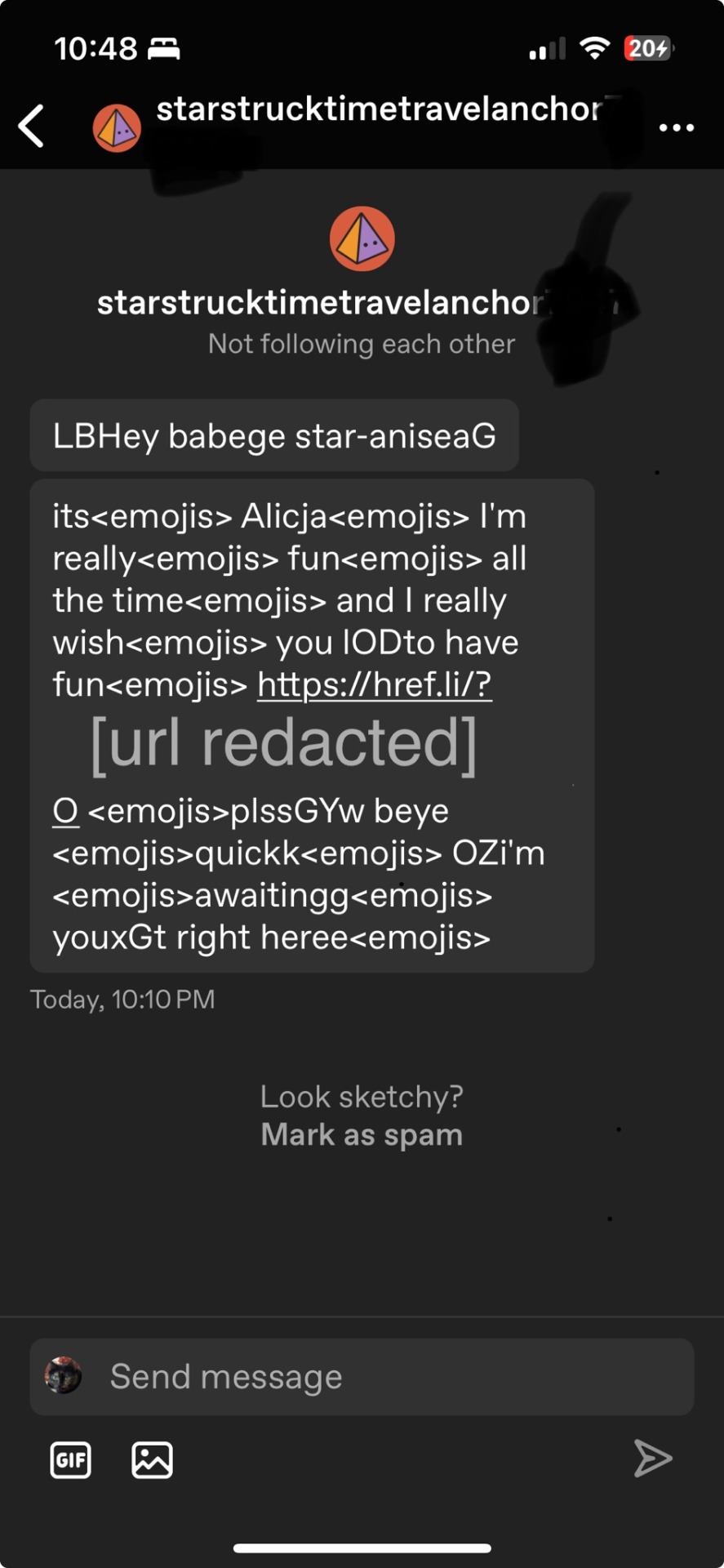
142 notes
·
View notes
Text
Everyone's got a take, and I've got a take too, about the current Internet Villain: James Somerton, a gay Youtuber who just got exposed (in the back half of a 4-hour video) as massively plagiarizing the work of LGBTQ+ media critics, historians, and memoirists, and then exposed in another 2-hour video as just making up the wildest nonsense about the topics he demonstrably had access to accurate information on.
He achieved a six-figure income on his work by squeezing money out of his audience with claims...
That only he was creating content that preserved queer history and elevated the voices and experiences of the LGBTQ+ community (a lie)
He was in serious financial distress and would have to go out of business if people didn't give him tons of money (a lie)
That he was going to use some of that cash to make definitely good and not-at-all-plagiarized independent movies, a thing he was definitely skilled and experienced enough to do (a lie), and
That those plagiarism allegations were incorrect,, and frankly,,,, hurtful and homophobic. (a GIANT lie)
Like, here's a visualization of the script of one of his videos, "Society and Queer Horror". The highlighted bits were lifted nearly verbatim from the works of others—the 18 authors identified at the time the exposé was posted—and presented as Somerton's own work.
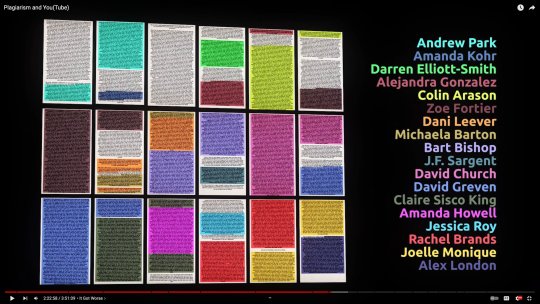
So here's what drives me absolutely up the wall about this:
If he had just ADMITTED that it was the work of other people, THAT WOULD STILL BE COOL. If he had just said, up front, "We are going on a survey of thoughts and insights people have had about this topic", that would still be a good video with a real audience!
Like yes, he studied business in university, he might not have gotten the kinds of research skills and knowledge someone like Kaz Rowe uses to not just report on the history and analysis of others, but evaluate their relative validity and trustworthiness.
But honestly, since watching my niblings (oldest is 13) watch Youtube, I think you honestly can't underestimate the number of viewers who are really hungry for someone saying, "I don't understand this topic! Let's explore it together!"
But NOOOOOOO, Somerton didn't want to be just some schmuck waxing enthusiastic about homoeroticism on film and acknowledging the smartness of other people. He wanted to be HIM, MR. SMARTYBOY, very sophisticated and alluring and thoughtful and deep. Definitely an intellectual heavyweight who just happened to spout off his own personal ideas and analysis that put him at the forefront of all the scholarship on the topic he's come across.
I hate being wrong. Hate being wrong. But blogging for most of my life has forced me to confront constant textual evidence that two or ten or twenty years ago, I said some dumb-ass shit. Honestly, it'd probably keep me up at night sometimes even if I didn't have a written record. I absolutely understand the desire to scan the field, find the coolest people around, and quickly clothe yourself in as perfect an imitation of them as you can manage.
But if you want to be an artist or a scholar who produces something lasting, you can't prioritize coolness over truth all the time. To develop your true, independent voice, you need to find a time and place where it is just you and just the work you're doing, and you have pick up your tools and say, I don't know if I'm doing this right, but this is what feels right to me.
There are a lot of things in life to which we can only truly contribute our presence and our perspectives. Things we can only witness or hold space for. We cannot go back and bleed the pain out of history, or erase the complexity of another person's life. Not honestly, at least.
But those are the times that need our presence, our perspectives, our witness, and our space. When we gather round and tell sad tales about the death of kings, honesty can be the only thing you give that's worth a damn in the large scale of things.
If this dude had owned up to the truth and honestly showed the work of trying to piece together a queer understanding of the world, trying to draw the threads of culture together until he found a place he fit inside them, it would have been so much more valuable to our culture as a whole.
He probably made more money this way, though. While it lasted.
531 notes
·
View notes
Text
When I started choosing embroidery patterns for my store, I was really focused on relatively small, simple designs. Things that would be quick and easy for beginners. But honestly... I think I underestimated just how easy the printed interfacing would be, since it's the needlework version of completing a dot-to-dot patterns. They take time, but none of the constant counting and ripping stitches out.
So that meant I've started to get ambitious. Little designs are still great, but what about a few designs that are dazzling from the other side of the room? As a treat?
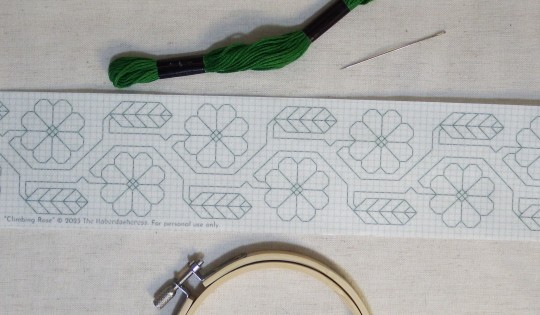

Maybe just one of Giovanni Ostaus's shirt opening border designs from 1561?
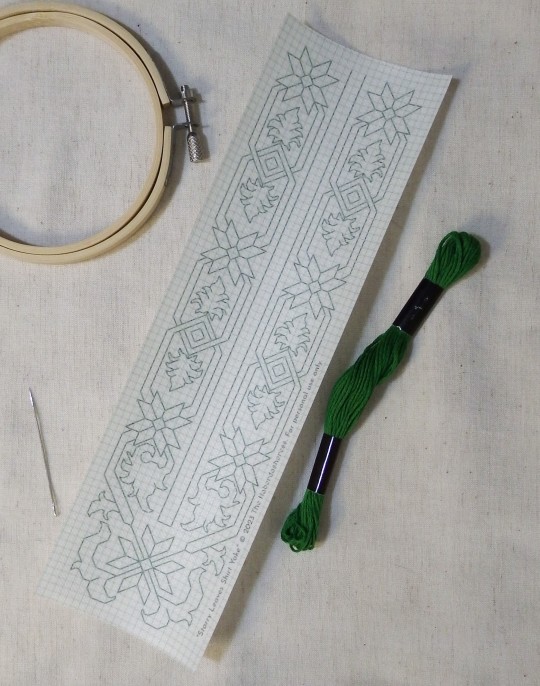
Some fancy chickens and um... tulips? pomegranates? water fountains?

And just for me, a pattern you won't find in any history book, a little confection I made that I like to call: "Strawberry Fieldmice Forever"
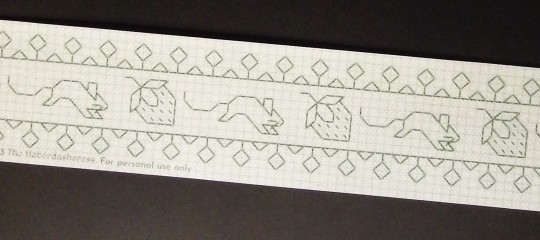
That's only like, half of them. I just dumped a whole bunch onto my Etsy.
Interested?
Beginner-friendly historical and fantasy embroidery patterns, right this way!
2K notes
·
View notes